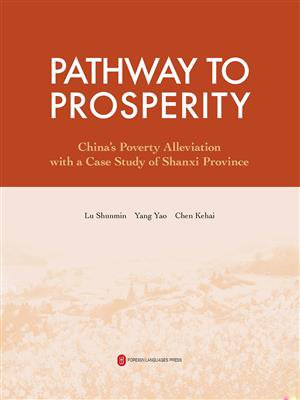The Woman Addressed as “Elder Sister” by General Secretary
“All happy families are alike; each unhappy family is unhappy in its own way.”
This is a famous quote of Tolstoy. There are similar sayings among the people of Shanxi Province. They say that each poor family is poor for a unique reason. The list of reasons for poverty could go on endlessly. Poverty is more a complicated social issue than an economic phenomenon, concerning the development of the rural society and even the whole country.
China raised its poverty line to an annual income of RMB2,300 per capita in 2011, RMB2,800 in 2014, RMB2,855 in 2015 and RMB2,952 in 2016. In theory, to identify the impoverished people in line with a set standard and then help them get out of poverty in accordance with a fixed pattern could help those most in need and meet an urgent need. However, a closer look into the impoverished households revealed that a simple standard is far from enough to identify poverty. That's why we spend six months visiting numerous poor households and try to get a clearer picture of poverty alleviation work in China.
As it's near the 12th lunar month, we arrived at the first stop in Kelan County in Shanxi Province.
On June 21, 2017, President Xi Jinping, also General Secretary of the Communist Party of China Central Committee and Chairman of the Central Military Commission, visited Kelan County in Shanxi. It's reported that General Secretary Xi spent more than 80 minutes in Zhaojiawa Village where he visited three impoverished households. In the TV footage, General President Xi chats with the villagers with deep concern and encourages them to work harder. He shakes hands warmly with an impoverished villager and asks about her age. Knowing that she's elder than him, General Secretary Xi said that “you're my elder sister!”
It made her a local star and many people went to visit the “elder sister”of General Secretary Xi.
In Kelan County, we must follow procedures for household interviews. The woman addressed as “elder sister” by General Secretary Xi was the first interviewee arranged by the local office of poverty alleviation. Her name is Wang Sannü.
At the time, Wang Sannü was living in the Guanghuiyuan Community in the county for resettlement of impoverished people. She is from one of the six relocated households in the village. Their households in the village were reclaimed. After more than a half year's urban life, the woman we saw looked younger than in the TV, just like other ordinary women in the city. This is how she should be like.
As we knew from her fellow villagers, she had lived an unfortunate life. After getting married to a man in Zhaojiawa, she gave birth to a son. However, her husband died in 2004 and then, her son died of cancer in 2014. She suffered a lot during those ten years. Then, her daughter-in-law, slightly mentally handicapped, abandoned the family and left a one-year-old daughter and a ten-year-old son to this woman in her 60s. What's worse, both kids suffer from physical disabilities, though they look beautiful and even smart. The first Party chief Chen Fuqing posted from the county people's congress told us about the first time he saw the two kids. He knew their conditions from the files beforehand, but when he actually saw them, he was still shocked and felt sorrowful.
Having been born and raised in mountainous areas, Wang Sannü was hard-working and able to bear hardships, but still she was almost crushed by the endless poverty and bad luck.
The kids' situation shocked Chen Fuqing, while the hardship facing Wang Sannü made him worry, since to tend a farmland of 50-plus mu would be too much even for a strong young man. Due to hard work all year round, Wang Sannü caught severe rheumatic heart disease. Moreover, she had two kids to take care of. Her home is about over 200 meters away from the well down a slope. She had to throw a bucket tied to the rope down into the well, fill it with water, pull it up, and then climb a slope to take the water back home. In winter, as the water around the well froze, she could only pull up half a bucket of water and walk on the slippery road to take water home. It's really unimaginable for an old woman to carry the bucket of water home on the slippery road in cold winter.
Her household must be registered as impoverished. She and the two kids are qualified for subsistence allowances, in addition to the aged insurance, the relief fund for the most in need, and the subsidy for returning farmland to forests. These added up to several thousand yuan and eased the burden on Wang Sannü.
But she insisted on farming the land, saying that she can't give it up, since it's the source of their food. Chen Fuqing and his colleagues made great efforts to finally persuade her to contract about 40 mu of the land to others and cultivate the remaining 13 mu by herself. The first Party chief and the work team, instead of standing by, helped the old woman farm the land, growing in spring, tilling in summer and harvesting in autumn. Wang Sannü said that she owed a lot to them. They're not related to her in any way, but they treat her like a family member. Every time Chen Fuqing met Wang Sannü, he greeted her warmly, which touched the old woman as well.
In 2017, as the work team was swamped with relocation work, programs and many conferences on poverty alleviation, Chen Fuqing asked several other men to till the land for Wang. After the corn and the millet were harvested, they planted potatoes and red kidney beans. However, as the harvesting time was approaching, Chen Fuqing got anxious, since they were too busy to help with the farm work at the time and cannot bear to leave the work to an old woman. Finally, he persuaded Wang to relocate to urban area and sell the land at the price of the crops on the land. He had found a buyer beforehand who agreed with a unified price of RMB700 a crop. Wang accepted the price. In the end, the buyer paid RMB5,700 for the crops on the land. Chen Fuqing helped Wang make a calculation and told Wang that she had a profit of over RMB2,000 after deducting the cost of hiring people, fertilizers, seedlings, plastic film and others. Even if the land was sold after harvest, the profit wouldn't get much higher.
Wang Sannü remembered that she moved on the third day of the eighth lunar month. The villagers all had fried cakes in congratulation. In the fall of the same year, the two kids began to enjoy relief for disabled children and went to a school in Xinzhou City for special education. Wang sent the kids to the school in person and urged the kids to behave properly and study hard.
In the twelfth lunar month, the two kids went home for holiday. As the grown-ups were talking, the two kids went to another room. Wang said that she'd never dreamed of having such a good life, with tap water, gas cooker and even private bathroom. She said embarrassingly that she couldn't use gas cooker at the beginning. She continued with a smile, “When General Secretary came, I changed my dress for the special occasion to show my respect.”
Chen Fuqing said that Wang wouldn't take off the dress for days after meeting General Secretary.
Wang Sannü said that “I watched Xinwen Lianbo every day to see the General Secretary. His appearance made me feel at ease.”
Many people were touched by General Secretary who called an ordinary old woman “elder sister.”
When we were about to leave, the two kids ran out. The girl showed one of her drawings to us. Yang Yao smiled kindly and squatted down to make an agreement with the girl who extended her finger for a pinkie promise.
As Yang Yao walked out, his face was smiling but his eyes full of tears.
The combination of subsistence allowances, the aged insurance, relief fund for major diseases, rural cooperative medical service, the PV power stations set by State Grid Corporation, as well as the public-service jobs, provides the guarantee for the annual per capita income of these impoverished households to reach or exceed the provincial poverty line of RMB3,200, so that they could get out of poverty.


